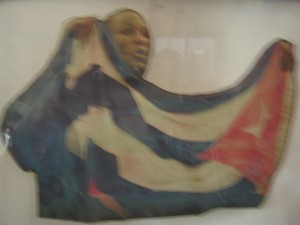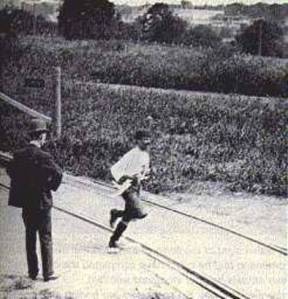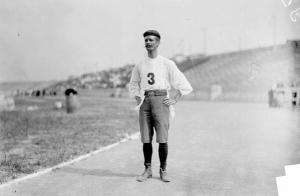FELIX CARVAJAL AND THE SAINT LOUIS OLYMPICS
The city of Saint Louis in the United States of America lies on the west bank of Mississippi river in the Missouri state. An important centre of the American midwest, it is called by some, the “gateway to the west“. Saint Louis played host to the third Olympic Games of 1904 beginning with the first one, in 1896 at Athens, Greece, from the vision and efforts of a Frenchman Baron Pierre de Coubertin. The second games were held in 1900 at Paris, France, Coubertin’s home country. Olympics were then, in an infantile stage lacking a proper systematic organisation. Participation though practically minimum was open and unlimited, the concept of national participation by a country’s best sports person, yet to find its application.
Festivities mostly unrelated to sports were arranged in conjunction with the Olympics often dwarfing the games into an appendage. In. 1900 a big international fair the Universal Exposition or the World Exhibition was organised in Paris, keeping in unison with the second Olympic Games. The third games were no exception. It is said that the US President, Theodore Roosevelt used influence to get the Olympics placed in Saint Louis to coincide with an international fair. That was the Louisiana Purchase Exposition of 1904, celebrating the centenary of the purchase of Louisiana region front France in 1803. The exposition got a grand shape, with five large exhibition buildings and. around 500 stalls, enticing, the presence of a multitude of foreign nations together with the states and territories of USA. Many local functions and celebrations of Saint Louis also joined ranks in merging their schedules with the Olympic programme. For an example, even the Missouri school boys` sports competition got an “Olympic label“.
Trans-Atlantic ocean voyage being a difficult proposition in those days of the early twentieth century, prompted very few European and other nations to venture across the high seas into Saint Louis, and the games consequently had quite a low number of participants. Within that competitor-scanty environment, USA reigned supreme, the games acquiring the status of being the most one sided affair in modern Olympics. Athletics saw four medals, only one of them gold, in the share of foreign athletes, the Americans grabbing the remainder. Boxing, cycling and rowing had every single gold medal moving into the US coffer. In swimming two of the European nations that landed up there, Hungary and Germany managed to stem the American tide. Cuba sprang. surprises, seizing , five out of the six gold medals coveted in fencing. A feat different from their current prowess in boxing, one of them Felix Savon completing a hattrick, of three consecutive gold medals at the Sydney Olympics of 2000 in Australia.
Saint Louis Games also has an association with a Cuban by the name Felix and the narrative to follow depicts his Olympic saga. He is Felix Carvajal, a postman from Cuba, who competed in the marathon and without a prize of a medal has his name permanently in the annals of Olympic Games, because of the spirit he emanated. A happy-go-lucky person, Carvajal started his preparation by staging shows in Havana and collected the money for his expedition to Saint Louis. He departed from Cuba in a boat, to arrive in the US coastal town of New Orleans. Here, indulgence in a warm-up game of crap gambling (prior to running) caused him to lose almost the whole of his accumulated wealth. Undeterred by the financial loss, he carried on in his endeavour, hitch-hiking his way to ultimately reach Saint Louis for the marathon. He showed up in the starting line-up for the marathon race, attired in a pair of heavy street shoes, a trouser and, a long shirt. Most records maintain that it was actually a night shirt. An American discus thrower taking earnest interest in the spectacle decided to intervene, and getting some cutting tools, had the shirt and the trouser cut down to an acceptable size. The shoes nevertheless remained in their original places. That was in brief on the casual gear in which Felix Carvajal took off in what to be known as his “fun run“.
On the race day, a hot weather of 32°C coupled with too much of dust and automobile exhaust, taxed heavily on the health and stamina of the runners. The rigour was, further compounded, by scarcity of drinking water, due to a single water station in the entire course, making the going harder for the parched competitors. The marathoners (save for one!) were all badly fatigued, a good number collapsing or simply dropping out of the race. Breathing polluted air under exertion caused one runner to develop severe lung ailment with bleeding, and was narrowly saved from dying. But one tried taking advantage from adversity. An American competitor by the name Fred Lorz got a cramp forcing him to take a car lift and be out of the race. After some time in motion, the vehicle also developed a snag and broke down. Lorz who by this time covered a considerable distance in wheels decided on using his legs and started running again. He arrived ahead of others in the stadium, amidst cheers for a mistaken hero, only, to be disqualified and suspended for a year. For another American with the name Thomas Hicks, the thermometer with the risen mercury caused the problem. Hicks running in the first position collapsed several times from severe exhaustion, records say, only to be revived by sips of brandy, eggs and repeated injections of strychnine, a drug nowadays banned in sports circle. The whole process requiring the constant attention of four attendants, who along with enthusiastic supporters kept Hicks from dropping out. He eventually tottered his way to win the race, with a. timing in excess of three hours, slowest ever for any Olympic marathon winner.
Nursing no such desire for a prize, Carvajal strode along with contentment, unfatigued. The harsh weather failing to have its effects on him. He made frequent stops on the way, picking up conversations with onlooking spectators and training himself in English. He snatched peaches from the games officials stationed en route and took apples from roadside orchards, coming up on the course of the race. He finished fourth, one short of a medal winning position but looked fresh and lively, unlike others at the conclusion of that grueling marathon ordeal. With his antics and fair performance, Felix Carvajal charged the atmosphere of the third Olympic Games with an air of fun and gaiety, rightly earning him the title “Clown king” of Saint Louis Games. Felix in Latin means happy and this individual on that occasion lived up to his name. Though not an eulogy to him, he brings to mind the starting lines of a song written by Lakshminath Bezbarua the great Assamese litterateur, written way back in 1909 at Howrah, Bengal, five years after, Saint Louis Games: (Koi jowa dakowal/Khoj kiyo kobal/Runukjunuk kino baje (Tell O’ postman/Why are the steps so fast/ What is that tinkling sound.)Click this link to this song sung by Khagen Mahanta in website Ri-Mita Melody
By : Dr Satyakam Phukan



Keep on writing, great job!